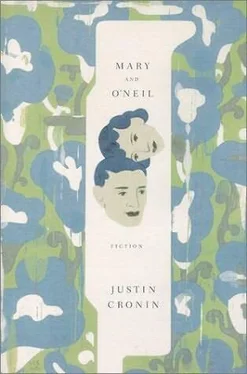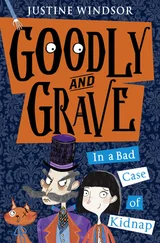Now the moment was upon them, and they set to the task at once-that very night, there on the sofa while their tea grew cold. After, they made the spaghetti O’Neil had promised, and talked at the kitchen table about the child they wished to have. They decided that they would like to have a girl, and that she would be named Nora, Emily, or Zoë. She would both be and look like Mary, though they also hoped she would draw certain qualities from O’Neil: his even temperament, his comfort talking to strangers, his easy athleticism and knack for tools. Her life would be interesting and prosperous, and they skipped around inside it as if they were perusing a magazine, reading an article here and there, returning to the table of contents to find another subject of interest. She would choose law or medicine, they agreed, though she would also harbor a lifelong passion for literature, and perhaps find time to take a Ph.D.-to finish the same degree that Mary had abandoned. They would take her often to the city, to expose her to music and theater and art, but in later life she would live in a cottage by the sea. They had never talked like this before, with such certainty about what they wanted for their lives, and by the time they went to bed, it seemed impossible to think that Mary wasn’t pregnant already.
But she wasn’t: not that month, and not the next one or the next, and by the time spring came, they had begun to worry. Mary had been pregnant once before-years in the past, a painful story she did not like to revisit-and from that experience she had carted away one belief: getting pregnant was easy. “Like falling off a log onto a man,” she said. The irony, now, was obvious, but it was hard to complain. So many years of thwarting their own biology, of rubber diaphragms dusted with cornstarch and sleek condoms in their foil pouches-they could hardly expect, now, to conceive on demand, like people ordering dinner in a restaurant. Mary kept track of her cycle, taking her temperature each morning before she rose and recording the information on a sheet of blue-lined graph paper she left by the bed. But by fall, when school resumed-after a summer of making love in bed, on the sofa, in a friend’s beach house in Cape May, on a picnic table in the Poconos, swinging in a hammock in the yard on Mary’s birthday-they agreed that something wasn’t working the way it should.
Their insurance plan allowed them to begin fertility counseling in November. The doctor who saw them was a young woman, very precise, with pencil-gray streaks in her long black hair.
“My prediction?” The doctor looked over their chart and shrugged at what she saw. “Pregnancy is just around the corner. You only need to give it time.”
“We’ve given it a year,” Mary said.
“And what a year I’m sure it’s been. Sometimes, however, it can take longer.” She dropped her eyes again to the chart. “Thirty-two years old. A history of irregular menstruation. Your period comes and goes like the March wind.” She closed the folder conclusively and waved a hand over it. “Have you tried wine?”
Mary leaned forward. “I’m sorry?”
The doctor settled back into her chair. “A glass of wine can ease the tension.”
“I am not tense,” said Mary.
“Aren’t there tests?” O’Neil asked. “Shouldn’t you be examining my sperm?”
The doctor yawned and glanced at her watch. “Pardon me. But no. It’s not something we do at this point. Have you ever looked at sperm under a microscope? It’s like the hordes at Mecca.”
That night they did as the doctor suggested and split a bottle of Chardonnay. It cost eleven dollars, was as sugary as a candy bar, and by the time they were finished they were both tipsy and babbling like toddlers. Struggling out of his jeans, O’Neil stumbled on the corner of the bedroom rug and watched as one of the finial posts on the bed frame rose toward his face, slowly and then quickly, like the bow of an ocean liner bursting from a bank of fog. In her robe Mary led him to the bathroom, sat him down on the toilet, and held a Ziploc bag of ice cubes to his nose.
“There’s always adoption,” O’Neil said through his thickening nose.
“We’re too old,” Mary said hopelessly, and began to cry. “Who would adopt us?”
In early January they returned to the doctor, who once again did nothing even remotely medical, apart from taking Mary’s temperature. Her questions seemed arbitrary. Did they sleep with the windows open or closed? Did they bathe, or take showers? Was O’Neil still jogging in the cold? The doctor listened to their answers, nodding and clicking her pen. Perhaps, she concluded, they might take a trip together, to take their minds off getting pregnant.
“I’ve found there’s something about a hotel that can be helpful for couples with this problem,” she said.
“This problem?” Mary repeated.
“Try one with movies in the rooms,” the doctor said.
It seemed silly; nevertheless, they decided to do it. All they had was the weekend, so they planned to drive north to see the town where O’Neil had grown up. In all their time together Mary had never actually been to Glenn’s Mills. The drive to upstate New York from Philadelphia took five hours, the last of these on country highways through scenes of such heartbreaking rural poverty that all they could do was marvel. But Glenn’s Mills itself had obviously been discovered. In winter twilight, fidgety from so many hours in the car, they drove down the town’s main street, past boutiques and antique shops, tearooms and craft studios. Though Christmas was long gone, pine boughs still hung from the streetlamps, which were ornately Victorian, like something from the set of a play. They half expected to see men out walking in capes and top hats, but most of the people on the street were wrapped in heavy parkas with scarves pulled up to their chins, hurrying somewhere, their heads tipped against the cold.
“None of this was here when I was a kid,” O’Neil explained. They glided past an herbal shop called the Witchery, then a corner Mobil station with a sign in the window that said: We Have Cappuccino!
O’Neil waved a sorry hand. “Who drinks all this espresso? This was always a boiled-coffee kind of town.”
At the Mobil station they bought turkey sandwiches, taco chips, and a six-pack of beer, and found their motel. It was clean and new, two stories tall, and bathed in a fluorescent glow. They ate their picnic on the bed, then put on their pajamas and climbed beneath the stiff covers. A folded card waited on the nightstand with the names of the movies they could order in their room. The usual fare, and then they came to the ones they were looking for: Up and Coming, Hot Housewives, and Pillow Talk II: Debutantes After Dark.
O’Neil voted for the third. “I liked the original. Is Doris Day in this one?”
Mary shook her head and continued to read. “‘The sexy adventures of a rich girl in Europe.’ It stars somebody named Chandra Loveman, though I don’t suppose that’s her real name.” She wrinkled her nose and peered at O’Neil with her head tipped to one side. “It doesn’t seem like enough to go on, really.”
“I’m not familiar with Ms. Loveman’s oeuvre,” O’Neil said, “but I would be willing to learn.”
They picked the first movie, because Mary, who had done graduate work in poststructuralism, liked the pun in the title. The movie was very dark, and there was a great deal of moaning in the shadows, and a soundtrack that pulsed tumescently whenever the sexy parts came along, which was nearly all the time. The plot was thin, but actually more than either of them had expected. A beautiful young man, orphaned by a tornado that destroys his family’s farm, moves from Iowa to California to find work in the movie industry. No sooner does he step off the bus than he is beset by unscrupulous female casting agents and producers, all seeking his favors. They are determined to corrupt him, but he outsmarts them; his past is gone, his gentle life in Iowa smashed by the four winds, and what is there for him now, but to give himself wholly to his gifts? It was all straight out of Balzac, and vaguely interesting, but the story would never last for very long, and then the music would resume, and the moaning. Sometimes the camera zoomed in so close that neither of them could tell what they were seeing.
Читать дальше












